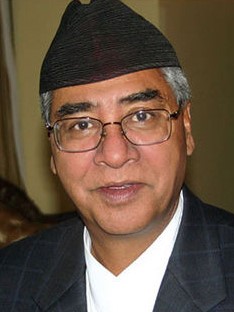‘Stronger democratization process as institutions like the judiciary won’t tolerate leaders like Oli misusing Constitution for power’.
New Delhi: After a period of turmoil in the Himalayan nation, Nepali Congress (NC) leader Sher Bahadur Deuba was appointed as the Prime Minister of Nepal for the fifth time on 13 July. A five-member constitutional bench of the Supreme Court in its landmark judgment had overturned the dissolution of the House of Representatives by former Prime Minister K.P. Sharma Oli on 21 May and directed President Bidya Devi Bhandari to appoint Opposition leader Deuba as the Prime Minister under Article 76 (5) of Nepal’s Constitution.
On 19 July, in the vote of confidence, Deuba managed to get 165 votes, exceeding the magic number of 136 in the 275-member House and secured a clear majority with almost all the political parties, including the Maoists and the Janata Samajbadi Party, supporting the government. The message from Nepal is clear that the process of democratization is getting stronger with the institutions like judiciary not going to tolerate any adventure by leaders like Oli to misuse the Constitution to hang on to power.
Sukh Deo Muni, one of India’s leading experts on Nepal said, “In removing Oli, the Nepal Supreme Court should be hailed for upholding democracy. The judgment also puts a formidable challenge before Deuba, Prachand, Madhav Nepal, Baburam and Upendra Yadav to ensure stable government and better governance.” It summarises the road ahead for the new ruling coalition in its one-and-a-half-year term. The PM and other power centres in the new political formation need to assure political stability, the process of strengthening of democratic values and address the challenges that had arisen due to the Covid-19 pandemic.
Immediately after Deuba won the vote of confidence in the Nepali Parliament, India’s Prime Minister Narendra Modi tweeted a congratulatory message. Modi wrote, “I look forward to working with you to enhance our unique partnership in all sectors further, and strengthen our deep-rooted people-to-people ties.” Later during the telephonic conversation, PM Modi promised to restart the supply of Covid-19 vaccines to Nepal. Since the second Covid-19 wave, supplies of vaccines have been halted by New Delhi.
With Deuba as the PM, India can expect to bury its differences with Nepal which reached a new low during the term of the previous PM. Since 2018, Oli had played the anti-India and Nepali nationalist card well to gain popularity in the hills by taking unilateral decisions like adding sovereign territories of India in the Kalapani region into the official political map of Nepal and rectifying it from Nepal’s Parliament.
Unlike Oli, the new PM is known to share good relations with New Delhi and has praised India’s non-interference and support during Nepal’s transition from monarchy to democracy. Moreover, Deuba does not have any Chinese tilt which was evident in Oli.
Overcoming the compulsions of coalition politics is a major challenge for Debua. “I have doubts over the survival and longevity of Deuba as the PM; there are tensions and conflict even within the Nepali Congress, how he would go ahead with cabinet expansion and portfolio allocation is another question,” Sanjay Kumar Bhardwaj, Professor of South Asian Studies in the Jawaharlal Nehru University, told The Sunday Guardian. “Apart from the internal dynamics of the Nepali politics, Deuba had many external and regional challenges ahead. Balancing India and China is a difficult task, what would happen to the Belt and Road Initiative (BRI) under him and the way ahead for US-Nepal partnership would be interesting to watch as the PM is considered in the good books of the USA and the European Union,” he added.
Therefore, Prime Minister Deuba is on the hot seat with the task to ensure political stability, managing the broad political coalition, maintaining friendly ties with the big powers and keeping autocratic forces in Nepali politics at bay.

